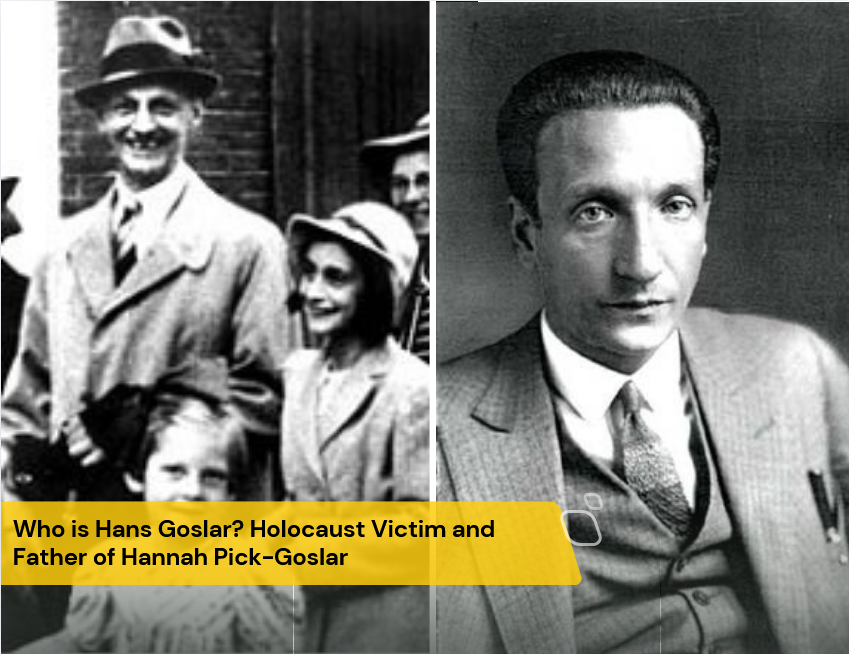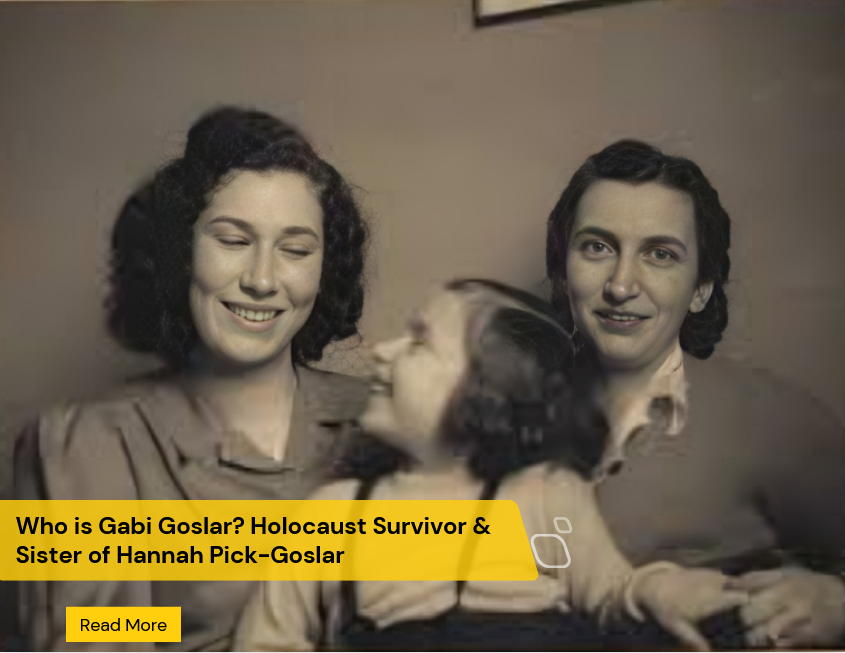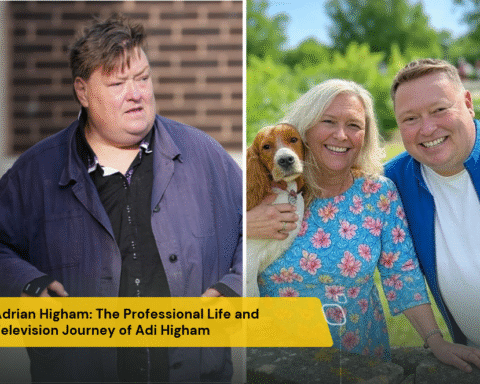Hans Goslar (1889–1945) was a respected German-Jewish journalist, public servant, and father of Hannah Pick-Goslar, known as Anne Frank’s childhood friend. Born in Hanover, Germany, he was a man of principle, intelligence, and leadership who dedicated much of his life to public service. However, like millions of Jews, his life ended tragically in the Holocaust, when he died in Bergen-Belsen concentration camp in February 1945 at the age of 55. Today, Hans Goslar is remembered not only as a devoted father and husband but also as part of the larger history of Jewish resilience and suffering under Nazi persecution.
| Detail | Information |
|---|---|
| Full Name | Hans Goslar |
| Date of Birth | November 4, 1889 |
| Place of Birth | Hanover, Germany |
| Date of Death | February 25, 1945 |
| Place of Death | Bergen-Belsen concentration camp, Germany |
| Age at Death | 55 years old |
| Parents | Gustav Goslar, Ida Goslar |
| Spouse | Ruth Judith Klee (m. 1926–1942) |
| Children | Hannah Pick-Goslar, Gabi Goslar |
| Grandchild | Ruth Pinchas Pick |
| Occupation | Journalist, Public Servant (Deputy Minister in Prussia) |
| Famous For | Holocaust victim, father of Anne Frank’s friend Hannah |
Early Life of Hans Goslar
Hans Goslar was born on November 4, 1889, in Hanover, Germany, to Gustav Goslar and Ida Goslar. He grew up in a Jewish household that valued education, tradition, and service. His upbringing in Germany during the late 19th and early 20th centuries placed him at the crossroads of modernity and rising anti-Semitism. From an early age, Hans showed an aptitude for academics, particularly in politics and law, which later shaped his professional career.
Education and Intellectual Background
As a young man, Hans pursued higher education with a strong focus on political science, journalism, and public affairs. He developed a keen interest in democracy, social justice, and Jewish identity within a modernizing Germany. His intellectual background positioned him for a career in public service and journalism, where he would make meaningful contributions before the Nazi rise to power.
Professional Career and Achievements
Before fleeing Germany, Hans Goslar built an impressive career. He worked as a journalist and later entered the German civil service, eventually becoming a Deputy Minister for Domestic Affairs in Prussia during the Weimar Republic. His role in government gave him influence in shaping policies during a turbulent time in Germany’s history. Unfortunately, his career was abruptly cut short in 1933 when the Nazis came to power and immediately dismissed Jews from public service.
Marriage to Ruth Judith Klee
In 1926, Hans married Ruth Judith Klee, a woman from a prominent Jewish family. Their marriage was built on shared values of faith, education, and family. Together, they had two daughters: Hannah (born in 1928) and Gabi (born in 1940). The family created a warm home filled with tradition and learning, even as the world outside grew increasingly hostile to Jews.
The Goslar Family Before the War
The Goslar family lived a comfortable life in Berlin before Hitler’s rise. Hans was respected for his professional work, and Ruth was admired for her grace and strength as a mother. However, the Nazi seizure of power in 1933 changed everything. Hans lost his government position, and the family faced mounting danger. They made the difficult decision to leave Germany and seek safety elsewhere.
Escape from Germany to the Netherlands
Like many German Jews, Hans Goslar fled with his family to the Netherlands in the 1930s. Amsterdam became their new home, where they joined a thriving Jewish refugee community. The move was both hopeful and bittersweet—hopeful because they had escaped immediate Nazi persecution, but painful because they had to leave behind their homeland, careers, and stability.
Friendship Between the Goslars and the Franks
In Amsterdam, the Goslars became neighbors of the Frank family, including Anne Frank. Hannah, Hans’s eldest daughter, became Anne’s closest childhood friend. This connection would later immortalize the Goslar family in history, as Hannah appears in Anne Frank’s diary under the pseudonym “Lies Goosens.” While Hans and Otto Frank (Anne’s father) knew each other, their bond was primarily through their daughters’ friendship.
Nazi Occupation of the Netherlands
The relative safety the Goslars found in the Netherlands ended in 1940, when Nazi Germany invaded. The family’s life once again turned upside down. Jewish families, including the Goslars, were stripped of their rights, forced to wear the yellow Star of David, and faced increasing restrictions. Hans, once a respected official, now had to navigate survival for his wife and two young daughters under relentless persecution.
Tragedy: Death of Ruth Judith Klee
In 1942, Hans suffered a devastating personal loss when his beloved wife Ruth Judith Klee died. Her passing left Hans as the sole caregiver of 14-year-old Hannah and 2-year-old Gabi. Despite his grief, he focused all his energy on protecting and nurturing his daughters, doing everything possible to shield them from the horrors of war.
Deportation to Westerbork Transit Camp
Eventually, the Goslars were deported to Westerbork, a Dutch transit camp used to send Jews to extermination camps. While conditions were difficult, Hans remained determined to keep his daughters alive. Witnesses describe him as a caring father who put his children’s needs before his own.
Imprisonment in Bergen-Belsen Concentration Camp
The family’s ordeal worsened when they were transferred to Bergen-Belsen concentration camp in Germany. Conditions in Bergen-Belsen were horrific: starvation, disease, and overcrowding defined everyday life. Hans, already weakened by years of struggle, tried desperately to care for Hannah and Gabi. Tragically, he did not survive. On February 25, 1945, just weeks before the camp was liberated, Hans Goslar died at the age of 55.
Death and Legacy
The death of Hans Goslar in Bergen-Belsen was one of millions of tragedies in the Holocaust. His daughters survived, thanks largely to his devotion and sacrifices during their imprisonment. His legacy endures through the lives of his children and grandchildren, particularly through Hannah Pick-Goslar’s testimony, which carried forward his memory and experiences.
Relationship with His Daughters
Hans’s role as a father remains central to his legacy. Hannah often spoke about her father with admiration, remembering him as strong, principled, and endlessly devoted to his children. For Gabi, who was very young when he died, memories came largely through her sister’s stories. Both daughters carried their father’s legacy into their own lives in Israel after the war.
The Significance of the Goslar Family in Holocaust History
The story of the Goslar family is not just personal but deeply historical. Because of their connection to Anne Frank, their testimony gained global recognition. However, beyond this link, Hans’s life reflects the tragedy of educated, professional Jews whose lives were destroyed by the Holocaust. His story helps us understand the human cost of hatred and persecution.
Remembering Hans Goslar Today
Today, Hans Goslar is remembered through books, documentaries, and Holocaust education programs. His life symbolizes the struggles of Jewish professionals under Nazi rule, while his death highlights the devastating loss of human potential. Through his daughters and grandchildren, his story continues to be told, ensuring that his memory is never forgotten.
Conclusion
Hans Goslar lived a life of service, integrity, and family devotion. Born in 1889 in Hanover, he rose to prominence as a public servant in Germany, only to lose everything under Nazi rule. Forced into exile, widowed during the war, and imprisoned in Bergen-Belsen, he died a victim of the Holocaust in 1945. Yet, through his daughters Hannah and Gabi, and through Holocaust remembrance worldwide, his story remains alive. His life reminds us of the importance of memory, justice, and resilience in the face of oppression.
FAQs About Hans Goslar
1. Who was Hans Goslar?
He was a German-Jewish journalist and public servant, best known as the father of Holocaust survivor Hannah Pick-Goslar.
2. When and where was Hans Goslar born?
He was born on November 4, 1889, in Hanover, Germany.
3. Who was Hans Goslar’s wife?
He was married to Ruth Judith Klee from 1926 until her death in 1942.
4. Did Hans Goslar survive the Holocaust?
No. He died in Bergen-Belsen concentration camp on February 25, 1945, at age 55.
5. Who were Hans Goslar’s children?
He had two daughters: Hannah Pick-Goslar (1928–2022) and Gabi Goslar (born 1940).
6. Did Hans Goslar know the Frank family?
Yes. His daughter Hannah was a close friend of Anne Frank, linking the families historically.
7. How is Hans Goslar remembered today?
He is honored through Holocaust remembrance, his daughters’ testimonies, and historical records that preserve his story.
For More Update and Stories Visit: Info Records















